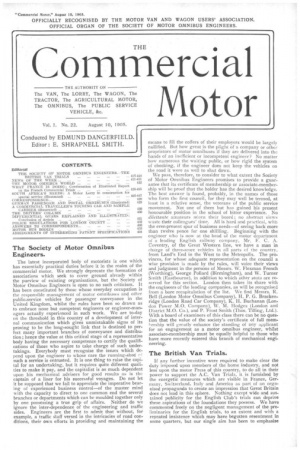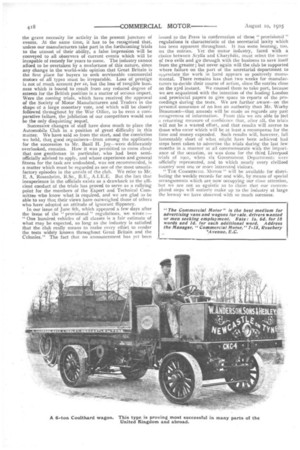The Society of Motor Omnibus Engineers.
Page 1

Page 2

If you've noticed an error in this article please click here to report it so we can fix it.
The latest incorporated body of motorists is one which has essentially practical duties before it in the realm of the commercial motor. We strongly deprecate the formation of associations which seek to cover ground already within the purview of existing organisations, but the Society of Motor Omnibus Engineers is open to no such criticism. It has been constituted by those whose everyday occupation is the responsible management of motor omnibuses and other public-service vehicles for passenger conveyance in the UnitedKingdom, whilst the rules have been so drawn as to embrace none but competent engineers or engineer-managers actually experienced in such work. We are to-day on the threshold in this country of a development of internal communication which gives unmistakable signs of its proving to be the long-sought link that is destined to perfect many important branches of conveyance and distribution; hence the value at this critical stage of a representative body having the necessary competence to certify the qualifications of those who aspire to take charge of such undertakings. Everybody must recognise the issues which depend upon the engineer to whose care the running-shed er such a service is entrusted. It is one thing to raise the capital for an undertaking, but it requires quite different qualities to make it pay, and the capitalist is as much dependent upon his mechanical advisers for good results as is the captain of a liner for his successful voyages. Do not let it be supposed that we fail to appreciate the imperative bearing of experienced business control—of the master mind with the capacity to direct to one common end the several branches or departments which can be moulded together only by one possessing a true grip of affairs. Neither do we ignore the inter-dependence of the engineering and traffic sides. Engineers are the first to admit that without, for example, a traffic itaff versed in the intricacies of road conditions, their own efforts in providing and maintaining the
means to fill the coffers of their employers would be largely nullified. But how great is the plight of a company or other proprietors of motor omnibuses if they are delivered into the hands of an inefficient or incompetent engineer? No matter how numerous the waiting public, or how rigid the system of checking, if the engineer does not keep the vehicles on the road it were as well to shut down.
We pass, therefore, to consider to what extent the Society of Motor Omnibus Engineers promises to provide a guarantee that its certificate of membership or associate-membership will be proof that the holder has the desired knowledge. The best answer is found, probably, in the names of those who form the first council, for they may well be termed, at least in a relative sense, the veterans of the public service movement. Not one of them but has gained his present honourable position in the school of bitter experience. No dilettante amateurs aeorn their board; no abstract views waste their colleagues' time. All is hard and practical, with the ever-present spur of business needs—of seeing back more than twelve pence for one shillling. Beginning with the engineer who is now at the head of the motor department of a leading English railway company, Mr. F. C. A. Coventry, of the Great Western line, we have a man in charge of three-score vehicles in all parts of the country. from Land's End in the West to the Metropolis. The provinces, for whose adequate representation on the council a wise provision is made by the rules, will voice their views and judgment in the persons of Messrs. W. Flexman French (Worthing), George Pollard (Birmingham), and W. Turner Smith (Eastbourne), in addition to which other seats are reserved for this section. London then takes its share with the engineers of the leading companies, as will be recognised from a bare recapitulation of the list. We find Messrs. R. Bell (London Motor Omnibus Company), H. P. G. Brackenridge (London Road Car Company), K. H. Buchanan (London Power M.O. Company), W. M. Hodges (London and District M.O. Co.), and P. Frost Smith (Thos. Tilling, Ltd.). With a board of examiners of this class there can be no question that the value of the society's certificate of full mem. hership will greatly enhance the standing of any applicant for an engagement as a motor omnibus engineer, whilst associate-membership must be equally helpful to those who have more recently entered this branch of mechanical engineering.
The British Van Trials.
If any further incentive were required to make clear the duty imposed upon members of the home industry, and not less upon the motor Press of this country, to do all in their power to support the A.C. Van Trials, it is furnished by the energetic measures which are visible in France, Germany, Switzerland, Italy and America as part of an organised propaganda to create an impression that Great Britain does not lead in this sphere. Nothing except wide and sustained publicity for the English Club's trials can deprive these aspirations of the foundations they possess. We have commented freely on the negligent management of the preliminaries for the English trials, to an extent and with a repeated insistence which may have begotten resentment in some quarters, but our single aim has been to emphasise the grave necessity for activity in the present juncture of events. At the same time, it has to be recognised that, unless our manufacturers take part in the forthcoming trials to the utmost of their ability, a false impression will be conveyed to all observers of current events which will be incapable of remedy for years to come. The industry cannot afford to be overtaken by a misfortune of this nature, since any change in the worldswide opinion that Great Britain is the first place for buyers to seek serviceable commercial motors of all types must be irreparable. Loss of prestige is not of much account per se, but the loss of tangible business which is bound to result from any reduced degree of esteem for the British position is a matter of serious import. Were the coming trials, which have received the approval of the Society of Motor Manufacturers and Traders in the shape of a large monetary vote, and which will be closely followed throughout by the War Office, to be even a comparative failure, the jubilation of our competitors would not be the only disquieting sequel. Successive changes of staff have done much to place the Automobile Club in a position of gireat difficulty in this matter. We have said so from the start, and the conviction we held, that good organisers—from among the applicants for the succession to Mr. Basil H. Joy—were deliberately overlooked, remains. How it was permitted to come about that one gentleman in particular, who had been semiofficially advised to apply, and whose experience and general fitness for the task are undoubted, was not recommended, is a matter which must be regarded as one of the most unsatisfactory episodes in the annals of the club. We refer to Mr. E. A, Rosenheim, 13,Sc., B.E„ A.I.E.E. But the fact that inexperience in the officials exists as a drawback to the efficient conduct of the trials has proved to serve as a rallying point for the members of the Expert and Technical Committee who know what is required, and we are glad to be able to say that their views have outweighed those of others who have adopted an attitude of ignorant flippancy.
In our issue of June 8th, which appeared a few days after the issue of the " provisional " regulations, we wrote :— " One hundred vehicles of all classes is a fair estimate of what may be expected, so long as the industry is satisfied that the club really means to make every effort to render the tests widely known throughout Great Britain and the Colonies." The fact that no announcement has yet been
issued to the Press in confirmation of these " provisional" regulations is characteristic of the secretarial laxity which has been apparent throughout. It has some bearing, too, on the entries, Yet the motor industry, faced with a choice between Scylla and Charybdis, must select the lesser of two evils and go through with the business to save itself from the greater ; but never again will the club be supported where failure on the part of the secretarial department to appreciate the work in hand appears so positively monumental. There remains less than two weeks for manufacturers to decide their course of action, since the entries close on the 23rd instant. We counsel them to take part, because we are acquainted with the intention of the leading London and provincial papers to give space to reports of the pro-. ceedings during the tests. We are further aware—on the personal assurance of no less an authority than Mr. Worby Beaumont—that amends will be made as regards any past meagreness of information. From this we are able to feel a returning measure of confidence that, after all, the trials will not be a wasted effort, and, that results will accrue to those who enter which will be at least a recompense for the time and money expended. Such results will, however, fall lamentably short of what mig-ht have been achieved had steps been taken to advertise the trials during the last few months in a manner at all commensurate with the importance of the occasion, as was done for the third Liverpool trials of Igoe when six Government Departments were officially represented, and to which nearly every civilised country sent one or more interested visitors.
" TIIE COMMERCIAL MOTOR " will be available far distributing the weekly records far and wide, by means of special arrangements which are now occupying our close attention, but we are not so egoistic as to claim that our contemplated steps will entirely make up to the industry at large the leeway we have observed with so much soreness.




















